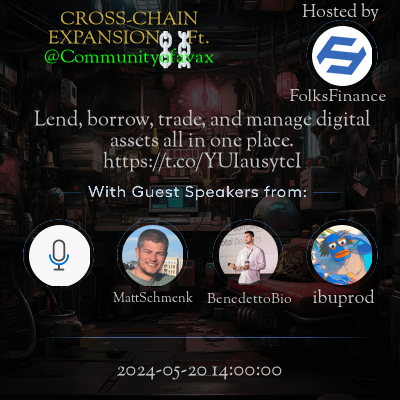This space is hosted by FolksFinance
Space Summary
The Twitter Space focused on the convergence of Real-World Assets (RWA) and Decentralized Finance (DeFi), discussing the transformative potential of integrating traditional financial assets with blockchain-based systems. Tokenizing real-world assets was highlighted as a key strategy to unlock liquidity in previously illiquid markets. The panel addressed the strategic application of KYC processes, the importance of permissionless systems, and the promising future of DeFi innovations bridging traditional finance with decentralized models. The role of blockchain in transforming illiquid assets, community engagement for refining applications, and upcoming technological advancements were key points of discussion, shaping a dynamic and collaborative future for the DeFi landscape.
Questions
Q: What are the signs of being in 'World War Three'?
A: Global disruptions and technological advancements could signify a transformative conflict era.
Q: How does technology affect modern warfare?
A: AI and advanced weaponry have transformed traditional warfare, posing new ethical and practical challenges.
Q: What are the privacy concerns with platforms like X?
A: There are significant issues around privacy and freedom of speech, with potential silencing of certain topics.
Q: How did the United Nations come about?
A: It replaced the League of Nations post-World War Two to manage global power and prevent future conflicts.
Q: What are the limitations of AI in content moderation?
A: AI struggles with understanding context, often leading to misunderstood or misclassified content.
Q: What personal stories highlight these discussion points?
A: Anecdotes about personal experiences with law, technology, and global events illustrate the broader themes.
Q: What ethical questions does technology raise in law enforcement?
A: Ethical concerns revolve around the balance of power, control, and the fairness of technological applications.
Q: What is the future of communication platforms?
A: There is a potential for genuine free speech, but challenges remain regarding regulation and control.
Q: How is digital identity managed currently?
A: Digital identity verification is critical, with evolving implications for privacy and security.
Q: What hypothetical scenarios were discussed?
A: Scenarios regarding global conflicts and technological dominance were explored in-depth.
Q: How are societal relationships changing with technology?
A: Technology is reshaping how we interact, trust, and build relationships on a global scale.
Q: How can tokenizing real-world assets benefit the DeFi ecosystem?
A: Tokenization unlocks liquidity, offering new trading options for traditionally illiquid assets.
Q: Is KYC required in all DeFi applications?
A: KYC can be strategically applied to specific products, maintaining a permissionless ecosystem.
Q: What is the role of blockchain in traditional finance?
A: Blockchain transforms illiquid assets into liquid, tradable instruments, enhancing market accessibility.
Q: Are permissionless systems completely unrestricted?
A: Permissionless systems blend with permissioned elements for compliance and broader participation.
Q: How important is technology in the future of DeFi?
A: Technological innovation is crucial for creating new financial products and integrating DeFi with traditional finance.
Q: What are secondary markets in DeFi?
A: These markets facilitate trading of tokenized assets, increasing liquidity and providing new trading opportunities.
Q: Why is community engagement important for DeFi projects?
A: Community feedback refines applications, shapes products, and ensures they meet user requirements.
Q: What is the trend for permissioned vs. permissionless systems in DeFi?
A: A hybrid model is emerging, combining the advantages of both to create flexible and compliant systems.
Q: Can DeFi innovations affect traditional financial markets?
A: DeFi innovations provide more efficient, transparent financial products, impacting traditional markets positively.
Q: What should participants expect in the DeFi space's future?
A: Look forward to technological advancements, product launches, and deeper integration with traditional financial systems.
Highlights
Time: 00:46:37
Personal Narrative
Time: 00:46:47
War Inquiry
Time: 00:47:04
Defining World War
Time: 00:47:12
League to UN
Time: 00:48:00
AI in Military
Time: 00:52:47
Free Speech on X
Time: 00:54:53
Content Silencing
Time: 00:55:13
Ethical Dilemma
Time: 01:00:00
Future Scenarios
Time: 01:05:00
Digital Verification
Time: 00:45:59
Tokenizing Potential: Unlocking new market opportunities by tokenizing real-world assets like homes.
Time: 00:46:00
KYC Requirements: Exploring the need for applicable KYC processes in certain DeFi transactions.
Time: 00:46:03
Trading and Compliance: Maintaining compliance in token trading through targeted KYC strategies.
Time: 00:46:17
New Utilities: Positive outlook on new utilities emerging from Real-World Asset tokenization in DeFi.
Time: 00:46:52
Market Liquidity Impact: Blockchain's contribution to liquidity by tokenizing traditionally illiquid assets.
Time: 00:47:03
KYC Strategies: Efficiently merging KYC requirements with permissionless DeFi products.
Time: 00:47:24
Permissionless Systems Importance: Significance of maintaining permissionless elements in DeFi.
Time: 00:47:35
Industry Direction: Trend towards integrating permissioned tools with permissionless systems in DeFi.
Time: 01:01:01
Final Insights: Experts emphasize community importance and innovation for DeFi's growth.
Time: 01:01:42
Upcoming Launches: Announcements on future product launches and DeFi technological advancements.
Key Takeaways
- Tokenizing real-world assets can unlock liquidity in traditionally illiquid markets
- driving new investment avenues.
- Strategic KYC processes can be applied to specific DeFi products while keeping the ecosystem open.
- Permissionless systems foster market participation
- blending compliance through permissioned elements.
- DeFi and traditional finance integration enhance efficiencies and create diverse investment opportunities.
- Blockchain technology revolutionizes illiquid assets into tradable instruments
- bridging traditional and DeFi markets.
- Technological advancements in DeFi break barriers between traditional and decentralized finance.
- Collaboration and innovation are key for DeFi's growth
- shaping industry consensus on hybrid permissioned-permissionless models.
- Secondary markets in DeFi offer trading opportunities for tokenized assets
- boosting liquidity and market accessibility.
- Community engagement is crucial for refining DeFi applications and meeting user needs effectively.
- DeFi innovations can impact traditional financial markets by offering transparent
- efficient financial products.







